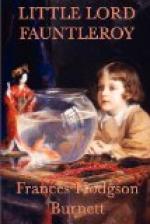The handsome, grim old face was ghastly. A bitter smile fixed itself upon it.
“I should refuse to believe a word of it,” he said, “if it were not such a low, scoundrelly piece of business that it becomes quite possible in connection with the name of my son Bevis. It is quite like Bevis. He was always a disgrace to us. Always a weak, untruthful, vicious young brute with low tastes—my son and heir, Bevis, Lord Fauntleroy. The woman is an ignorant, vulgar person, you say?”
“I am obliged to admit that she can scarcely spell her own name,” answered the lawyer. “She is absolutely uneducated and openly mercenary. She cares for nothing but the money. She is very handsome in a coarse way, but——”
The fastidious old lawyer ceased speaking and gave a sort of shudder.
The veins on the old Earl’s forehead stood out like purple cords.
Something else stood out upon it too—cold drops of moisture. He took out his handkerchief and swept them away. His smile grew even more bitter.
“And I,” he said, “I objected to—to the other woman, the mother of this child” (pointing to the sleeping form on the sofa); “I refused to recognize her. And yet she could spell her own name. I suppose this is retribution.”
Suddenly he sprang up from his chair and began to walk up and down the room. Fierce and terrible words poured forth from his lips. His rage and hatred and cruel disappointment shook him as a storm shakes a tree. His violence was something dreadful to see, and yet Mr. Havisham noticed that at the very worst of his wrath he never seemed to forget the little sleeping figure on the yellow satin cushion, and that he never once spoke loud enough to awaken it.
“I might have known it,” he said. “They were a disgrace to me from their first hour! I hated them both; and they hated me! Bevis was the worse of the two. I will not believe this yet, though! I will contend against it to the last. But it is like Bevis—it is like him!”
And then he raged again and asked questions about the woman, about her proofs, and pacing the room, turned first white and then purple in his repressed fury.
When at last he had learned all there was to be told, and knew the worst, Mr. Havisham looked at him with a feeling of anxiety. He looked broken and haggard and changed. His rages had always been bad for him, but this one had been worse than the rest because there had been something more than rage in it.
He came slowly back to the sofa, at last, and stood near it.
“If any one had told me I could be fond of a child,” he said, his harsh voice low and unsteady, “I should not have believed them. I always detested children—my own more than the rest. I am fond of this one; he is fond of me” (with a bitter smile). “I am not popular; I never was. But he is fond of me. He never was afraid of me—he always trusted me. He would have filled my place better than I have filled it. I know that. He would have been an honor to the name.”




